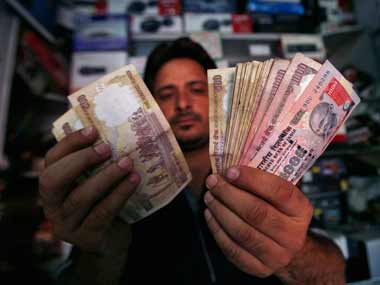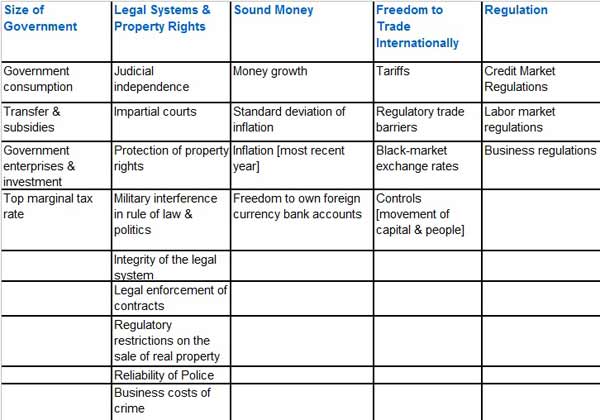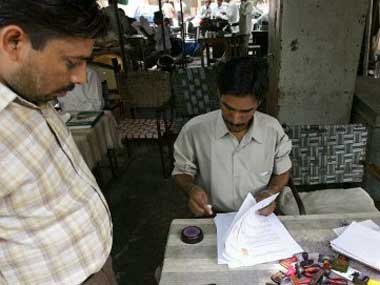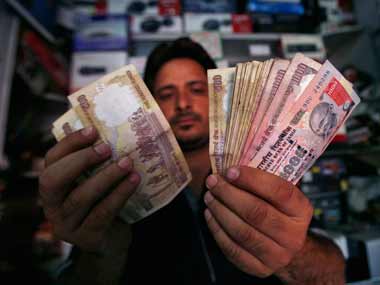India, ladies and gentlemen, has been keeping questionable company, sitting snugly within a cluster that includes Azerbaijan, Bangladesh, Iran, Mali, Nigeria, Pakistan, Sierra Leone, Syria & Tanzania.
The ‘Economic Freedom of the World: 2012 Annual Report’ released by the Fraser Institute, ranks India a dismal 111th globally. Since it is our national ide fixe to compare our exalted status in the cosmic order with that of Pakistan, let us take a moment to revel in the cosmos’ sense of humour - India and Pakistan share the 111th spot.
Bangladesh and Nepal occupy the 109th and 110th place respectively. Ghana, Botswana, Cambodia, Kazakhstan & El Salvador are ranked approximately 40 places ahead of us. Ethiopia, Angola, Myanmar, Burundi, Congo & Mozambique have fared worse than us - not by a significant margin though
The top five positions are occupied by Hong Kong, Singapore, New Zealand, Switzerland, Australia & Canada, the last two nations being ranked joint 5th.
The first obvious question: Why should we care about India’s dismal placement in this Index?
[caption id=“attachment_624902” align=“alignleft” width=“380”]  Harder to do business in India? Reuters[/caption]
One very important reason lies in the correlation established between economic freedoms and enhanced social, political, economic and individual well being. “Nations that are economically free outperform relatively non-free nations in indicators of well-being”, states the report, before going on to give a few examples:
a) The average per-capita GDP for the nations in the top quartile of economic freedom is approximately 7 times that of those in the bottom quartile
b) In the top quartile, the average income of the poorest was about 10 times higher than that of the poorest in the bottom quartile
c) Life expectancy was 79.5 years in the top quartile compared to 61.6 years in the bottom quartile
d) Political and civil liberties were considerably higher in economically free nations than in the rest.
A slew of studies over the last two decades have found that greater economic freedom leads to healthier economies with higher investment rates & economic growth, higher income levels, and more rapid reduction in poverty rates. Similarly, an extensive body of research over the same period illustrates that economic, political and legal institutions exert a major impact on cross-country differences in both per capita income and economic growth.
The second obvious question: How meaningful and reliable is this index?
A quick look at the methodology detailed in the report reveals adherence to certain important methodological principles:
First is an emphasis on objective components as they offer better reliability than those that rely on surveys or value judgments. “Given the multidimensional nature of economic freedom and the importance of legal and regulatory elements, it is sometimes necessary to use data based on surveys, expert panels, and generic case studies. To the fullest extent possible, however, the index uses objective components.”
Second, the reliability of the data furnished directly by the respective countries could misrepresent facts due to various reasons. Hence the data-sets used to construct the index ratings, the report goes on to state, “are from external sources such as the International Monetary Fund, World Bank, and World Economic Forum that provide data for a large number of countries. Data provided directly from a source within a country are rarely used, and only when the data are unavailable from international sources.”
The third obvious question: So what does the index measure and in what depth?
The Economic Freedom of the World project, headed by Milton and Rose Friedman and Michael Walker, spelled out the 4 cornerstones of economic freedom thus:
• Personal choice
• Voluntary exchange coordinated by markets
• Freedom to enter and compete in markets
• Protection of persons and their property from aggression by others.
Using the framework created within these four crucial parameters, the index measures the degree of economic freedom present in five major areas:
1. Size of Government
2. Legal System and Security of Property Rights
3. Sound Money
4. Freedom to Trade internationally
5. Regulation.
24 components go into the five areas; in some cases, the components are themselves made up of several sub-components. In total, the index comprises 42 distinct variables.
“Each component and sub-component is placed on a scale from 0 to 10 that reflects the distribution of the underlying data. The sub-component ratings are averaged to determine each component. The component ratings within each area are then averaged to derive ratings for each of the five areas. In turn, the five area ratings are averaged to derive the summary rating for each country.”
The following table spells out the taxonomy in terms of the Areas & Components [for a deep-dive into sub-components, please see page 5 of the Economic Freedom of the World: 2012 Annual Report here ]:
A quick recap of the top-of-the-mind examples from all areas that impact this country and its citizens - social, quality of life, welfarist policies, economic and fiscal policies, business climate and challenges, administration and law & order, efficacy and reliability of the criminal justice system, criminality & corruption in politics etc - and the entire taxonomy suddenly starts making eminent sense.
Key India-centric Findings: Since there are numerous findings, I have zeroed in on a few which represent the overall scenario. For the complete list of findings and data-tables etc., you can go through the EFW 2012 report, the hyperlink to which has been provided in the section above.
• The 2010 scores in the 5 broad areas were 6.37 [Size of Government], 5.55 [Legal Systems], 6.42 [Sound Money], 6.28 [Freedom to Trade Internationally] & 6.70 [Regulation].
• In the period 1985-2000, the country registered impressive overall improvement [on the comprehensive top-line score]
• However, in the period 2000-2010, the comprehensive score has been almost stagnant; if one compresses the timeline further, it has actually dipped significantly in the period 2005-2010
[caption id=“attachment_624904” align=“alignright” width=“380”]  An inflated bureaucracy? AFP[/caption]
• The cost of a bloated, inefficient and ineffective bureaucracy & administration is captured in the Area referred to as “Size of the Government”. Couple this with the messed up political landscape [lack of integrity, vision, ethics, transparency etc], and resulting impact on the other 4 areas becomes immediately obvious. For a more detailed explanation, please see pages 2-7 of the source document.
• The drop in the scores [2005-2010] on Judicial Independence, Impartial Courts & Protection of Property Rights is alarming. For instance on Judicial Independence, the score dropped from 8.16 to 5.57. Unless the nation takes meaningful steps in the direction of electoral reforms, I am afraid the judicial reforms that the country is crying out for will not happen. The intent and integrity of the legislature and the executive, as I have spelled out in an earlier pieces [see here and here ], is where things always hit a dead-end.
• A similar comparison between 2005 and 2010 on Business Costs of Crime, paints an equally gory picture.
• On a 10-point scale, India’s score on Legal Enforcement of Contracts stands at a pitiable 2.59 currently!
For a comprehensive score-card, please refer to page 88 of the source document.
Finally, I leave you with the following words from the report:
Political incentives will lead politicians to “trade” favors to interest groups in exchange for political contributions that will help them win the next election. When the government becomes heavily involved in activities that provide favors to some at the expense of others, people will be encouraged to divert resources away from productive activities and toward lobbying, campaign contributions, and other forms of political favor seeking. All of these shortcomings tend to corrupt the political process and lead even democratic governments to adopt counterproductive policies.
And it is these counterproductive policies on all fronts that are robbing the country and its citizens of a brighter future - one where performance on all fronts is more in step with actual potential…..
But for that to happen, the government needs to get out of the business of business - and focus singularly on the business of governance?
shining.path.notperu@gmail.com


)
)
)
)
)
)
)
)
)



